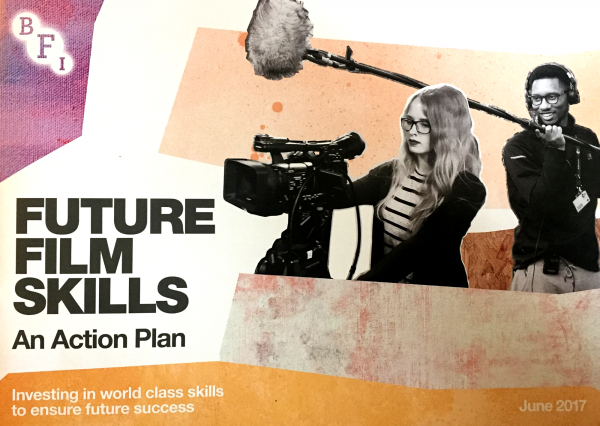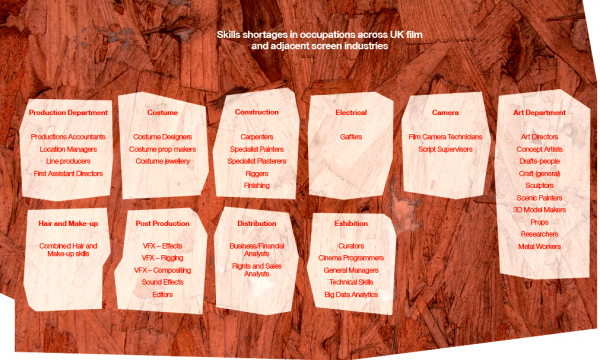BFI Announce a £20m Lottery investment and 10-point plan to train 10,000 new entrants
BFI Announce a £20m Lottery investment and 10-point plan to train 10,000 new entrants.
 The Film Industry Task Force, including Barbara Broccoli, Kathleen Kennedy and BFI Chair Josh Berger, announce 10 point plan in unprecedented skills push.
The Film Industry Task Force, including Barbara Broccoli, Kathleen Kennedy and BFI Chair Josh Berger, announce 10 point plan in unprecedented skills push.
London 28th June 2017
The BFI has launched Future Film Skills – An Action Plan, at the Houses of Parliament this evening. The 10-point plan was written by The Film Industry Task Force, which was chaired by 007 producer Barbara Broccoli. The plan has been designed to address the “critical” skills shortage facing the industry, by investing £20m of lottery funding into an unprecedented wave of training.
A specially commissioned report by the Work Foundation has estimated that the industry needs 10,000 new entrants with 30,000 job opportunities over the next 5 years; an eye-watering 2,000 new entrants a year.
Iain Smith, the producer of Mad Max: Fury Road and a member of the Film Industry Task Force said: “There is a connection between skills and productivity. The task of the British Film Commission is to bring in film productions and inward investment to the UK. Without skills, we cannot sustain these productions”.
The screen industries have boomed since the introduction of the tax credit incentives in Film and TV Drama. UK film is now worth £4.3bn to the economy and it is the UK’s fastest growing sector. Investing in skills training is a priority.
The report has identified 9 departments with the most pressing skills shortage and the increasing overlap between Film and TV Drama. The departments identified in the report are Production, Art Department, Construction, Electrical, Camera, Costume, Hair and Make Up, Post-Production and Visual Effects.
Read the 10 Point plan below...
The action plan calls for clearer information, vocational training and ongoing support. Good, clear information and demystification of the industry (shameless plug alert: like that found in ‘Breaking into UK Film and TV Drama’), is the first step to help bring more new entrants to the business.
This blue print puts inclusivity and industry participation at its heart. 007 Producer Barbara Broccoli spearheaded the Task Force, saying ““We live in a diverse society and it is vital both culturally and commercially that our industry reflects this in front of and behind the camera. With industry, education and government uniting behind this new Film Skills Strategy and 10 Point Action Plan we know we will be able to increase the number of people working in film and ensure we have a representative workforce.”
Many details of the plan are still to be confirmed but the BFI expect to appoint a delivery body within 12 months. Calls for tenders will be opened within the next few months.
THE 10 POINT ACTION PLAN
1. A trusted and reliable careers information service
New online portal building on the information already available through BAFTA Guru, HIIVE and Into Film.
2. An accreditation system to guarantee employer confidence.
Developed in partnership with the industry to gain the confidence of new entrants, parents, teachers and employers that the skills they are learning will be valued by employers.
3. A Suite of new apprenticeship standards
New legislation that came into force this April means that all employers with a payroll of £3m+ must pay into the apprenticeship levy. It is unclear how many productions will be effected as most films fall under the £3m payroll threshold and the handful that do qualify, do not film the minimum 1 year requirement for an apprenticeship. The BFI are currently in consultation to adapt existing laws to work for the industry.
4. A Skills Forecasting Service
A regularly updated planning service to identify current trends and future demands to ensure the industry is prepared for the next wave of skills needs.
5. Embed the BFI Academy into the skills pipeline
Build on the success of the academy, which has built a network of over 4,500 young people, some of whom are on the first rung of the ladder and a diverse range of backgrounds.
6. Launch a mentoring service for new entrants and returnees
Regular coaching and advice from experienced crew members. Although described as a service, it is unlikely that the BFI will be able to afford paying mentors for their time, so will call upon volunteers within the industry to come forward.
7. World-class centres of excellence for screen related craft and technical skills.
The BFI will partner with a small number of Institutes of Technology to create new, state of the art training centres around the UK that will produce ‘set ready’ students that the industry can hire directly from.
8. New bursary programme to ensure wide participation
A new discretionary fund to help those on lower incomes to overcome practical obstacles such as travel costs, accommodation and child care, that might otherwise prohibit someone being able to get work.
9. Professional Development Courses to ensure our workforce maintains world-class skills.
Continuing professional development for those in mid to senior positions, with a focus in business courses, sales, distribution marketing and exhibition.
10. Mobilise the industry
The BFI call upon the talents of those already in the industry to participate through guest speaking, mentoring, one-to-one meetings to inspire the next generation.
Overall, this is an exciting and necessary plan that puts industry needs and inclusivity at its core. It is a considerable task to get 2,000 new entrants a year into the industry. It may even take a year for the tender application process to be finalised, meaning 2,500 new entrants a year to hit the 10,000 in 5 years target. But the induction will be through a variety of methods and training platforms.
The action plan raises some interesting questions about training and the industry. The report identifies the role of further and higher education. That FE and HE institutions “provide a broad overview of what is a considerable sector - may fail to deliver the industry specific skills needed, particularly for craft and technical roles”. This is not what any prospective student or parent would want to hear as they prepare for university life (and a £27,000 debt) this September.
thecallsheet.co.uk highlighted this very concern at the beginning of 2015, when speaking at the Institute of Training in Television Production and in this subsequent article with video, ‘Are universities preparing their students for the job market’
Action points 6 and 10 may require a shift in culture to harness the industries collective knowledge. Will more freelance crew from the industry have the time or inclination to participate in continual mentoring and support if it is a) unpaid and b) while they spend 14 hours a day at work already (including travel times). One virtuous trade off might be to offer experienced crew free continuing professional development for themselves, if they also engage in mentoring of new entrants.
Among the critical factors to address in the action plan is to educate new entrants, the report found that: “Young people lack a true understanding of the screen industries, including the breadth of roles available”. The report also encourages more links from education to employment and that “industry improves the recruitment, retention and advancement of under-represented groups”
When asked about the drive for inclusivity, the BFI said that they will not be aiming for a diversity target per production (like TV Broadcasters require for the much criticised project diamond) but for a general rise of diversity across the entire workforce. The report states that only 40% of the workforce are women (47% in all other sectors), BAME crew make up only 3% of the workforce (13% of the population), 5% have declared a disability (11% across all industries) and those from less advantaged backgrounds represent only 12% of the workforce (34% across all other industries). LGBT groups are relatively well represented in the screen industries.
The plan also has the backing of Star Wars producer Kathleen Kennedy, who gave placements to 28 BFI trainees on the new Untitled Han Solo Project at Pinewood studios. Kennedy praised the inclusivity of the scheme, saying “Diversity is just as important behind the scenes as it is on the screen. More points of view, more perspectives, and more voices will only make films better”.
Have your say, tell us what the current best training courses in the industry are and why.....
